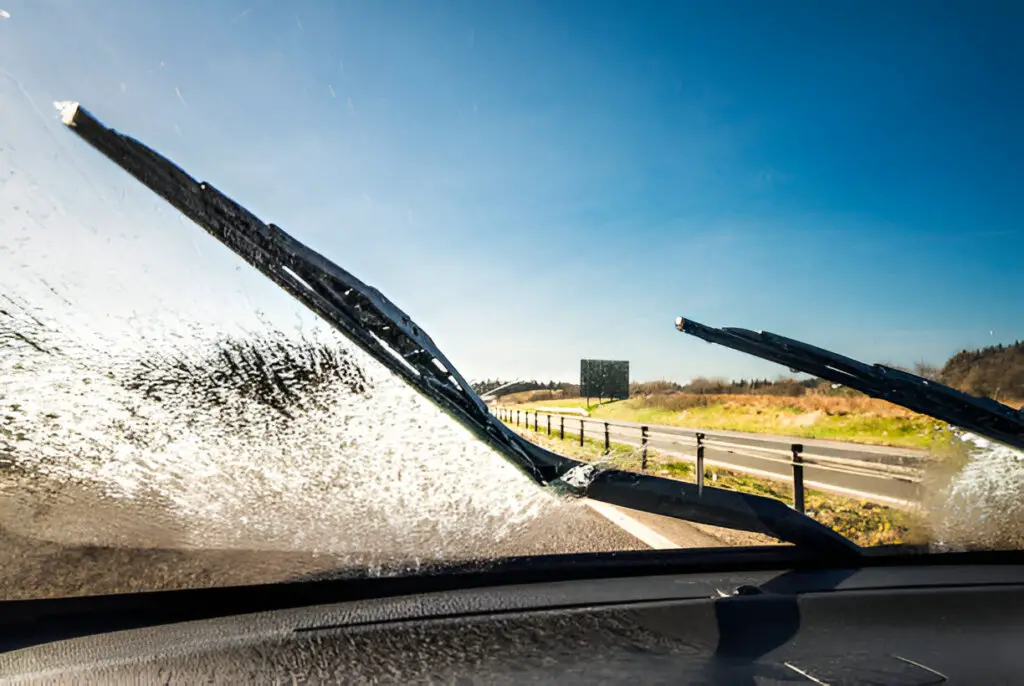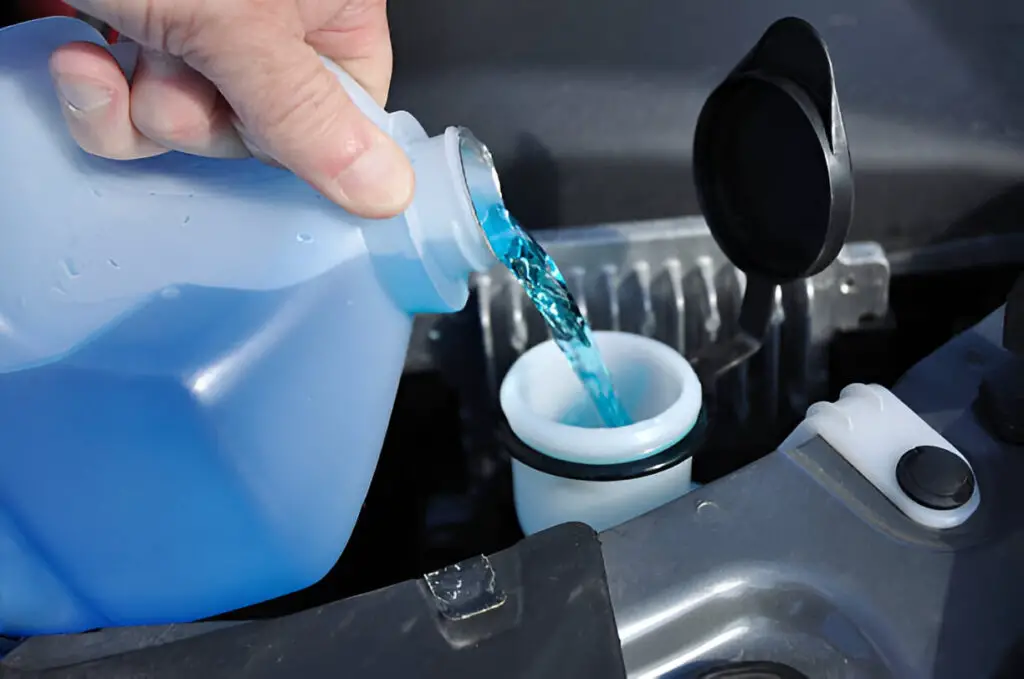You can use water in your windshield wiper fluid reservoir temporarily, but it’s not ideal. Water can freeze in cold weather and doesn’t clean as well as windshield fluid, which contains antifreeze and cleaning agents.
Windshield wiper fluid is an essential part of vehicle maintenance that often goes overlooked. It helps keep your windshield clean, improving visibility and safety, especially during challenging weather conditions like rain, snow, or dust storms. However, when it comes to refilling your windshield wiper fluid reservoir, you may wonder if it’s okay to substitute specialized windshield wiper fluid with water.
In this post, we’ll take a closer look at this question and explore whether using water is a viable or safe alternative, the advantages and disadvantages, and provide some expert insights on maintaining your vehicle’s windshield system.

Contents
Why Do Consider Using Water in Windshield Wiper Fluid?
The idea of using water in place of windshield wiper fluid often arises for several reasons:
- Cost Savings: Windshield wiper fluid is relatively inexpensive, but people may still be tempted to save money by using water.
- Availability: If you’re out of windshield fluid and need an immediate solution, you might consider water as a quick fix.
- Environmental Concerns: Some people are concerned about the chemicals found in windshield wiper fluids and prefer to use a less harsh substance like water.
However, these considerations may not outweigh the potential drawbacks of using water in your windshield wiper system.
The Risks of Using Water Instead of Windshield Wiper Fluid
While it might seem like an easy solution, using water as a substitute for windshield wiper fluid poses several risks and challenges:
1. Freezing in Cold Weather
One of the main ingredients in windshield wiper fluid is antifreeze, which prevents the fluid from freezing in cold temperatures. Water, on the other hand, has a freezing point of 0°C (32°F). If you use water in your windshield washer reservoir in a cold climate, the water can freeze, potentially damaging the reservoir, pump, and hoses. Frozen water in these components can lead to costly repairs.
In contrast, most commercial windshield washer fluids are designed to withstand temperatures as low as -20°C (-4°F) or lower, depending on the formulation.
2. Inefficient Cleaning
Water alone lacks the cleaning power of specialized windshield wiper fluids, which contain detergents that effectively remove dirt, grime, bugs, and bird droppings. Water may not be able to break down oil-based substances or bugs, leaving streaks or smudges on the windshield. This can reduce visibility and lead to a hazardous driving experience.
Additionally, commercial wiper fluid often contains surfactants that help the fluid spread evenly across the windshield, reducing streaks and leaving a clear, polished surface. Water doesn’t provide this benefit, leading to inefficient cleaning and possible distractions while driving.
3. Mineral Buildup
Another drawback of using tap water is the potential for mineral deposits to form inside the windshield washer system. Depending on where you live, tap water can contain minerals like calcium and magnesium. Over time, these minerals can build up in the washer fluid reservoir, pump, and hoses, reducing the effectiveness of your windshield washer system and potentially leading to clogs or malfunction.
In contrast, commercial windshield fluids are designed to be free of minerals and other particulates that could clog the system.
4. Lack of Anti-Bacterial Properties
Windshield wiper fluid often contains additives that prevent the growth of bacteria and algae in the fluid reservoir, especially in warmer climates. Water alone doesn’t have these properties, and over time, bacterial growth can lead to unpleasant odors or even clogs in the system.
5. Damage to Windshield Wiper Blades
Windshield wiper fluid contains lubricants that help the wiper blades glide smoothly across the windshield. Water doesn’t have this property, and over time, using water instead of windshield fluid can lead to premature wear and tear of the wiper blades. Worn-out wiper blades can leave streaks on the windshield or fail to clear the glass effectively, further reducing visibility during rain or snow.

When Can Water Be Used in Windshield Wiper Fluid?
While windshield wiper fluid is generally the best choice, there are situations where water may be a temporary solution. Here are some scenarios where you might consider using water:
1. Emergency Situations
If you’re in a bind, and you’ve run out of windshield wiper fluid, using water can serve as a temporary solution to clear off your windshield. However, this should only be a stopgap measure, and you should refill with proper windshield fluid as soon as possible.
2. Warm Climates
In warm, tropical climates where temperatures don’t drop below freezing, you could use water in the short term without worrying about it freezing in the reservoir. However, even in these regions, it’s recommended to use distilled water to prevent mineral buildup and to mix it with a small amount of window cleaner for better cleaning power.
3. Seasonal Considerations
In some areas, you might be able to use water during summer when freezing isn’t a concern. However, it’s essential to switch back to commercial wiper fluid before the colder months arrive to prevent freezing and other issues.
Frequently Asked Questions
Here are some FAQs about putting water in windshield washer fluid –
1. Can I mix water with windshield washer fluid?
Yes, in warmer climates, you can mix distilled water with windshield washer fluid to stretch your supply, but this is not advisable in cold weather due to the risk of freezing. Also, mixing with water dilutes the cleaning effectiveness of the fluid.
2. Is windshield washer fluid toxic?
Yes, most windshield wiper fluids contain methanol, a toxic chemical that should never be ingested. Always handle wiper fluid carefully, and keep it out of reach of children and pets.
3. How often should I replace my windshield wiper fluid?
There is no set timeframe for replacing windshield wiper fluid, but you should top it up as needed. It’s important to check the fluid regularly, especially before long road trips or during seasonal changes.
4. Can I make my own windshield washer fluid?
Yes, you can make DIY windshield washer fluid using a combination of distilled water and dish soap. However, it’s important to note that these homemade solutions lack antifreeze and other chemicals found in commercial products, so they may not be suitable for cold climates.
5. What should I do if my windshield washer fluid freezes?
If your windshield washer fluid has frozen, try parking your car in a warm garage to thaw it. Once it’s thawed, drain the system and replace the fluid with one designed for colder temperatures to prevent future freezing.
Conclusion
While water may seem like an easy and cost-effective alternative to windshield wiper fluid, it’s not recommended for long-term use due to the risks of freezing, inefficient cleaning, and potential damage to your windshield washer system. Windshield wiper fluid is specifically designed to tackle the challenges of keeping your windshield clean and clear in various weather conditions, and it’s worth investing in the right product for the safety and maintenance of your vehicle.
If you find yourself in an emergency, using water is fine temporarily. However, always switch back to commercial windshield washer fluid as soon as you can to ensure your windshield remains clean, clear, and ready for the road ahead.